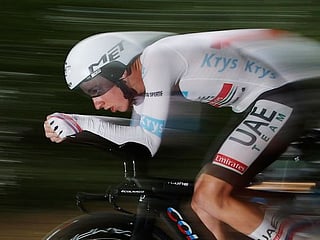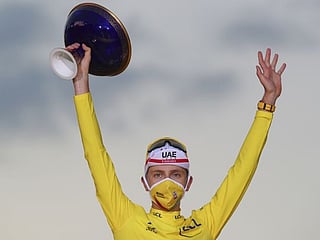Tadej Pogacar — the ‘other’ Slovenian rider who came good for UAE in Tour de France
Story of a calm, calculated youngster upsetting established order with UAE Team Emirates

Around this time last year, Tadej Pogacar finished third at the Vuelta a Espana. He was just 20, making him one of the youngest riders ever to finish on the podium of a Grand Tour.
A year later — he turned 22 a day after his biggest career win — Pogacar has literally sent a mocking signal to all things old, while throwing convention out of the window and signalling the arrival of something fresh and new in the world of cycling.
Pogacar doesn’t exactly come from a sporting family. His dad is a furniture designer, specialising in chairs, and his mum is a language teacher. His cycling career started when a family friend introduced him and older brother Tilan to a local coach. Both brothers were very competitive with Tadej having a rare mix of a cool and calm demeanour along with a killer instinct that stands out even today.
Now, Slovenia is not exactly a country famous for its cycling talent, especially given the fact that the sport began to establish itself on the international map only after the break-up of the former Republic of Yugoslavia in the 1990s. So, if seeing a rider like countryman Primoz Roglic dominating throughout the Tour de France was a bit of misguided haze, then what followed on the penultimate day on Stage 20 displayed what another Slovenian rider called Pogacar is actually made of.
Admittedly, Pogacar had been deemed too young and inexperienced to be even there on the opening day in Nice. In fact, Pogacar had gone into the Tour with the same mindset he had going into the 2019 Vuelta. He initially expressed his support for teammate and the far more experienced Fabio Aru while stating: “If Aru feels really good we’ll go for the yellow jersey and I will support him 100 per cent.”
However, the Italian ran into trouble early and dropped off from the list of General Classification contenders on the early mountain stages and eventually abandon the race on Stage 9. It was in those early days that the mental transformation seemed to occur as the Slovenian convinced himself and the rest at UAE Team Emirates that he is their best bet at doing the unimaginable.
Lost minutes
Pogačar quickly took over the role as team leader upon himself and managed to meander through the first week safely without being involved in any crashes. His biggest blemish, though, was that he lost a precious 1.21 minutes to the leaders on Stage 7 after being caught up in the crosswinds.
Slowly, he started asserting himself after that. In the second week, Pogacar won Stage 9 to Loudenvielle by outsprinting his main rivals Roglic, defending champion Egan Bernal and Marc Hirschi, who had been on an 80km solo breakaway.
In the third week, Pogacar won Stage 15, which was another mountain stage that finished at the summit of the Col du Grand Colombier to hoist himself up into second overall and within a minute of Roglic.
And then followed the decisive moment on the penultimate stage of the Tour — a 36km time-trial — that saw the best of the young rider that saw him not only put up a historic individual performance, but also win his third stage of the Tour finishing ahead of the more established Tom Dumoulin and Richie Porte by 1.21 minutes.
But much more importantly was that Pogacar defeated his countryman Roglic by 1.56 minutes to take in an unbeatable sort of advantage of 59 seconds heading into the 21st and final stage of the Major into Paris the following day.
Pogacar’s precocious ability to rip up the plan and thrive can perhaps best be explained from a race back home in Slovenia when as a nine-year-old he was spotted racing against much older riders by former rider Andrej Hauptman — a bronze medallist for Slovenia in the 2001 World Championships road race and now the country’s national elite coach. At that time, Hauptman had a government post working with young riders and he had turned up a bit late for the race.
The first thing he saw was a big group of teenage riders leading and a much younger small guy lagging 100 metres behind trying to catch up. Hauptman insisted with the organisers that it is important to pace this small chap up to the front again, only to be told that the youngest rider was actually the leader after having lapped the whole field once.
Unsurprisingly, Hauptman took it upon himself to keep a close eye on this small chap, up to a point where he later became his trainer and mentor. In fact, it was Hauptman who also proved to be a key influence in getting Pogacar signed with the UAE Team Emirates, thanks to his close contacts with both Giuseppe Saronni and the current team manager, Mauro Gianetti.
It’s not just the physical strength that plays in Pogacar’s favour. He’s clearly blessed with steely self-confidence, and the courage to risk his General Classification position by launching all-out attacks on the field. “When I saw that Lopez had attacked and made some mistakes, I went for it — all or nothing. I started to lose it a bit. I got through by telling myself the guys behind were really tired, too,” he said.
Younger days
His attack to Gredos was a little like his career so far; he didn’t know what would happen one day to the next. But now after nearly a month, like at Gredos, everything has worked in his favour. “I felt like I was throwing a dice,” he related.
“What have you got to lose if you do your best? It doesn’t matter what the result is. If you go for it and your head is in the right place, there’s nothing to worry about,” he added.
What began in a small sleepy town of Komenda finally came a full circle following the final stage of the race over 122 kms from Mantes-la-Jolie to the majestic line on the Avenue des Champs-Elysées in Paris as the cycling world celebrated Pogacar as the first Slovenian to win the Tour de France. And in good measure, Pogacar also took two other accolades — the King of the Mountains polka dot jersey and the white jersey for the Best Young Rider — while also becoming the youngest winner of the Tour since 1904.
Comparisons with Roglic — the most successful Slovenian rider — are inevitable, particularly as Pogacar took his breakthrough third place in the same Vuelta where Roglic took his first Grand Tour win. But at least, we can be certain that this Slovenian has the ability and mindset to dominate the sport for years to come.
“This hasn’t sunk in yet. It will take a long a long time for me to realise I have won the biggest race in the world. I have been dreaming of this as a youngster. I always wanted to race with the best and I will need some time to realise what has just happened,” he said.
Sign up for the Daily Briefing
Get the latest news and updates straight to your inbox










